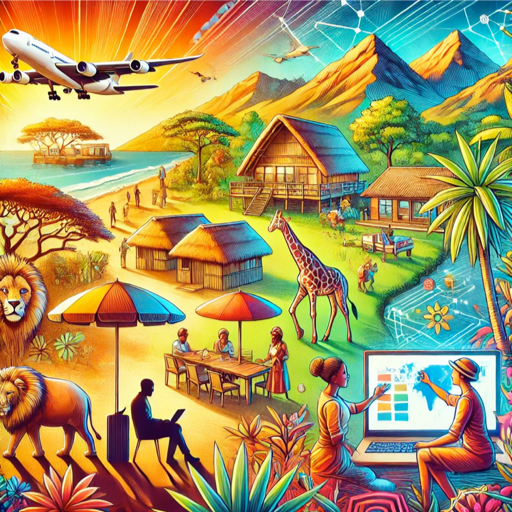
Africa’s tourism industry is poised for unprecedented growth in 2025, driven by dynamic trends and new opportunities that promise to reshape the continent’s travel landscape. As governments and businesses invest in infrastructure, technology, and unique experiences, the time is ripe for stakeholders to capitalize on this momentum. Here are the key trends and insights driving the expansion of the African tourism market in 2025.
- Growth of Sustainable and Eco-Tourism
Travelers are increasingly prioritizing sustainability and eco-conscious experiences. Africa’s rich biodiversity, from the Serengeti to the Okavango Delta, positions the continent as a global leader in eco-tourism. In 2025:
- Demand for community-based tourism and conservation-focused trips is expected to grow.
- Lodges and resorts that adopt green practices, such as renewable energy and waste reduction, will attract eco-conscious travelers.
- Partnerships with local communities will foster authentic and sustainable travel experiences.
- Rise of Digital Nomad Tourism
The global rise of remote work is fueling a new wave of digital nomads seeking affordable, exotic locations. African destinations such as Cape Town, Zanzibar, and Kigali are emerging as hotspots due to their affordability, connectivity, and vibrant cultures. Tourism businesses can:
- Offer long-stay packages with high-speed internet and co-working spaces.
- Provide unique cultural experiences to attract remote workers looking for more than just a workspace.
- Market destinations as safe and convenient for remote work.
- Adventure and Niche Travel Experiences
Africa’s diverse landscapes cater to adventure seekers and niche travel enthusiasts. Trends for 2025 include:
- Increased interest in adrenaline-pumping activities like safari trekking, mountain climbing, and diving.
- Growth in culinary tourism, with travelers exploring local cuisines and wine regions.
- Expansion of wellness tourism, including yoga retreats, spa experiences, and traditional healing practices.
- Investment in Infrastructure and Connectivity
Governments and private investors are prioritizing infrastructure development to make travel across Africa more seamless. Key advancements include:
- Expansion of international airports and regional airlines, improving connectivity between major tourist hubs.
- Modernization of roads and rail networks to enhance access to remote attractions.
- Implementation of e-visas and regional travel agreements to simplify border crossings.
- Embracing Technology and Innovation
Technology continues to revolutionize how travelers discover, book, and experience destinations. For 2025:
- Mobile apps and AI-powered chatbots will provide personalized travel recommendations.
- Virtual reality (VR) tours will inspire travelers to book African destinations.
- Cashless payment systems and digital platforms will make transactions safer and more convenient.
- Focus on Domestic and Regional Tourism
While international travel is recovering, domestic and regional tourism is on the rise. African travelers are exploring their own continent like never before, driven by:
- Affordable travel options, such as budget airlines and local tour operators.
- Campaigns promoting intra-African tourism, such as the African Union’s Agenda 2063.
- Growing middle-class populations with higher disposable incomes for leisure travel.
- Collaborations and Partnerships
Collaboration will be key to unlocking Africa’s tourism potential. Governments, private sectors, and international organizations are:
- Investing in marketing campaigns to position Africa as a must-visit destination.
- Collaborating with influencers and travel bloggers to reach global audiences.
- Developing cross-border tourism initiatives, such as multi-country safari packages.
Conclusion
The African tourism market in 2025 is brimming with opportunities for growth and innovation. By embracing sustainability, technology, and regional collaboration, stakeholders can position Africa as a premier global destination. Whether you’re a business owner, investor, or traveler, now is the time to contribute to the vibrant future of African tourism.
Let’s build an industry that not only boosts revenue but also preserves the natural and cultural heritage that makes Africa extraordinary.
